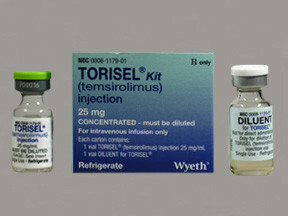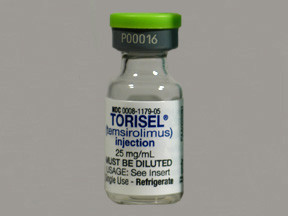TEMSIROLIMUS - INJECTION
PHONETIC PRONUNCIATION: (tem-sir-oh-LEE-muss)
COMMON BRAND NAME(S): Torisel
GENERIC NAME(S): temsirolimus
Uses
USES: This medication is used to treat kidney cancer. It works by slowing or stopping the growth of cancer cells.
How to use TEMSIROLIMUS - INJECTION
HOW TO USE: This medication is given by injection into a vein by a health care professional. It is usually given once a week (over 30 to 60 minutes) or as directed by your doctor. The dosage is based on your medical condition, interacting drugs, and response to treatment. Your doctor may direct you to receive another medication (e.g., diphenhydramine) before the injection to help prevent side effects (infusion reactions). Use this medication regularly to get the most benefit from it. To help you remember, mark the days on the calendar when you need to receive the medication.
Side Effects
Precautions
Interactions
Overdose
Images
Reviews
Faq for TEMSIROLIMUS - INJECTION
Temsirolimus injection is a medication used for the treatment of certain types of cancer, including advanced renal cell carcinoma (a type of kidney cancer) and mantle cell lymphoma (a type of non-Hodgkin lymphoma).
Temsirolimus is classified as a kinase inhibitor and works by inhibiting the protein mTOR (mammalian target of rapamycin). This helps to slow down the growth and spread of cancer cells in the body.
Temsirolimus injection is given directly into a vein (intravenous infusion) over a period of 30-60 minutes. The dose and frequency of administration may vary depending on the specific type of cancer being treated.
Some common side effects of Temsirolimus injection include fatigue, nausea, decreased appetite, rash, diarrhea, cough, fever, and headache. It is important to notify your doctor if you experience any severe or persistent side effects.
Yes, there are certain precautions and warnings to be aware of before starting Temsirolimus injection. It may cause serious allergic reactions, increase the risk of infections, and affect blood clotting. It is important to inform your doctor about any pre-existing medical conditions or medications you are taking.
Temsirolimus injection may harm an unborn baby, so it is generally not recommended during pregnancy. It is also not recommended while breastfeeding, as it may pass into breast milk and could harm the nursing baby. It is important to discuss the risks and benefits with your doctor.
Yes, there are potential drug interactions with Temsirolimus injection. It is important to inform your doctor about all medications you are currently taking, including prescription drugs, over-the-counter medications, and herbal supplements.
The effectiveness of Temsirolimus injection varies depending on the type and stage of cancer being treated. It may take several weeks or months to see a noticeable response to the treatment. Your doctor will monitor your progress and adjust the dosage as needed.
The dosage of Temsirolimus injection is determined by the patient's body weight and specific medical condition. Your doctor will carefully calculate the appropriate dosage and frequency of administration based on these factors.
Disclaimer
IMPORTANT: HOW TO USE THIS INFORMATION: This is a summary and does NOT have all possible information about this product. This information does not assure that this product is safe, effective, or appropriate for you. This information is not individual medical advice and does not substitute for the advice of your health care professional. Always ask your health care professional for complete information about this product and your specific health needs.


No Reviews Yet